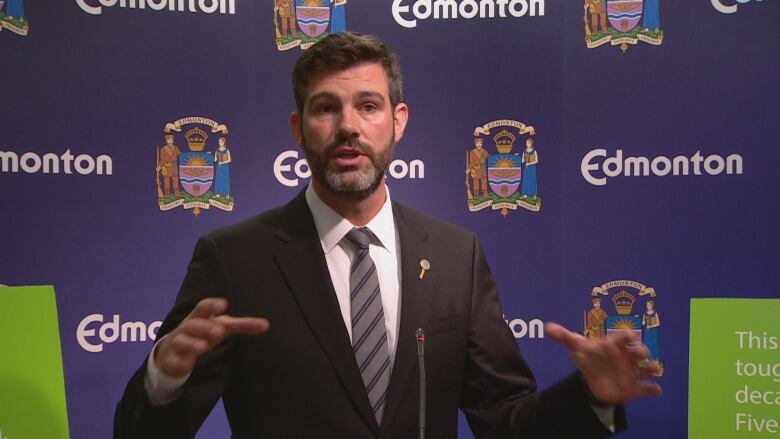Edmonton faces 'toughest budget' in a decade, mayor warns
Don Iveson lays out 5-point plan to cut spending and 'out-of-step' tax hikes

Taxpayers, business owners and the province are pressuring the city to cut spending, says Mayor Don Iveson.
"We have heard loud and clear fromEdmontoniansand from the business community specifically that they are looking for some [tax] relief,"IvesontoldreportersTuesday morning.
"This will be Edmonton's toughest budget in a decade," he said.
- Edmonton's 4-year budget plan murky until province steps up
- Edmonton business group urges city hall to put the brakes on rising property taxes
Iveson'sfive-point plan for upcoming budget talks calls for council to "limitnew spending, protect our existing investments, make the right cuts, and sign a new funding deal with the provincial government."
The plan also includes a new approach to paying for suburban growth.
'Everything is on the table'
Council must make tough decisionson cuts to services and facilities,Ivesonsaid.
The city is one-third of the way through aprogram and service review and some items should be ready to be considered in budget discussions, he said.
"Through a methodical and evidence-based review of each one of our services, everything is on the table," Iveson said.
"The main message here is that we cannot afford to keep doing everything that we're doing and keep taxes under three per cent for the next several years without making some tough decisions," he said.
When it comes to new requests for money, Iveson said they mustbe limited.
The plan also looks at reducing how much the general property taxpayer contributes torecreation centres, fire stations and roads in new suburbs.
Recent changes to theMunicipal Government Act givethe city new tools when it comes to levying taxes, he said.
For example, a new neighbourhood needing a fire hall would bear the biggest portion of the cost rather than have it borne by taxpayers across the city, he said.
At the same time, Iveson said, the city cannot fall behind on maintenance of its core infrastructure such as LRT, roads and sewers.
Discussions are underway with the province for a new funding deal for municipalities to help cover the costs of infrastructure projects, he said.
Rather than grants, municipalities are looking for a revenue-sharing system that would see transfers to cities grow as the economy grows, Iveson said.
The province has promised to bring something forward this fall in the form of legislation, he said.
'We have been paying'
Coun. Andrew Knack said he often gets asked why the costs of building fire halls and recreation centres in newareas aren't borne by those who choose to build homes in the new neighbourhoods.
"I don't think it's unreasonable to have a conversation as a city about the cost of growth," Knack told reporters Tuesday.
"We have had some of these conversations over the last few years. And we know that all ofus who live in mature neighbourhoods, or anyone living inside the Henday, we have been paying for all of those new rec centre facilities, those new libraries, those new fire halls."
He said it might be worth looking at having new home prices "reflect the truecost of growth, because one of the arguments that does come up is at what point do all of the existing homeowners in the city ... say, 'Well, wait a second, we're paying for all of this new growth.' "
In a news release, the Edmonton Chamber of Commerce said it was encouraged by Iveson'scommitment to prioritize cost reductions and tax competitiveness.
"It is essential that these positive initiatives yield meaningful results in the upcoming city budget," chamber president Janet Riopel said in the release. "The viability of many businesses, and our ability to attract new investment, is at stake."
The business group Prosperity Edmonton also showed support for Iveson's approach.
"Edmontonhas a long track record of increasing property tax revenue at a pace that exceeds increases in population plus the rate of inflation, an annual trend that stretches back more than a decade," the group said in a news release. "This is not sustainable."












_(720p).jpg)


 OFFICIAL HD MUSIC VIDEO.jpg)
.jpg)



























































































